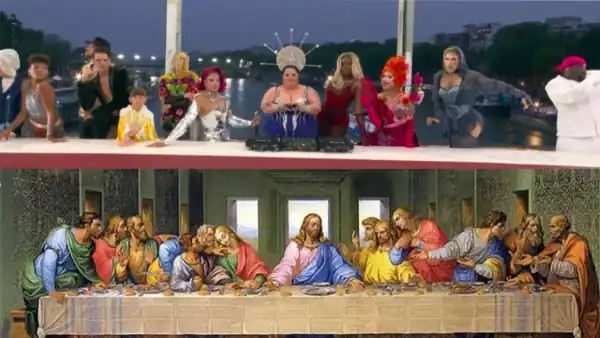
In a statement released the day after the Olympic Games’ opening ceremony, the French Bishops’ Conference (CEF) praised the event’s “wonderful moments of beauty, joy, and rich emotions” but also voiced concern over what they described as “excess and provocation” in certain scenes.
The opening ceremony, held on July 26, 2024, was a spectacle of unprecedented scale, with delegations from around the world parading on 85 boats along the Seine River.
The event featured artistic performances by global stars such as Canadian singer Céline Dion and American artist Lady Gaga, drawing widespread acclaim for its grandeur and creativity.
However, the CEF’s statement took a critical stance on elements of the ceremony that they felt were disrespectful to Christian sensibilities. The main point of contention was a performance featuring a reenactment of Leonardo da Vinci’s “The Last Supper,” performed by ten men in drag. The Bishops’ Conference expressed deep disapproval of this segment, highlighting it as an instance of “derision and mockery of Christianity.”
The CEF’s statement also reflected a broader concern, noting that many Christians worldwide might feel hurt by what they perceived as the ceremony’s disregard for religious sensitivities.
The Bishops assured that they hoped these individuals would understand that the Olympic celebration aimed to transcend ideological biases, despite the actions of a few artists.
In response to the ceremony’s controversial elements, leaders from other religious denominations showed solidarity with the French Catholic Church.
The CEF’s General Secretary, Father Hugues de Woillemont, took to social media to highlight what he saw as a contradiction between the ceremony’s claimed inclusivity and the actual exclusion of certain believers.
He criticized the use of religious themes to promote fraternity while disregarding the feelings of many Christians.
Bishop François Touvet, President of the CEF’s Communication Council, also voiced his concerns on social media, calling the performance a “scandalous and grave insult to Christians worldwide.”
He emphasized that the ceremony’s excesses had overshadowed its intended celebration of unity and human fraternity.
Michaël Aloïsio, spokesperson for the Paris 2024 Olympic Organizing Committee, defended the ceremony’s artistic choices.
In a statement to Franceinfo, Aloïsio affirmed the committee’s commitment to pushing boundaries and exploring new forms of expression, despite the controversy.
The opening ceremony concluded with a powerful performance by Céline Dion, who sang Edith Piaf’s “Hymn to Love” from the first floor of the Eiffel Tower.
The song’s final words, “God reunites those who love each other,” provided a poignant end to an otherwise contentious event.
The CEF’s statement concluded by reiterating their belief in the positive impact of sport and Olympism, emphasizing that these movements are meant to serve unity and human fraternity.
Despite the criticisms, the ceremony was ultimately appreciated by many spectators for its artistic achievements and the emotional resonance of its concluding moments.